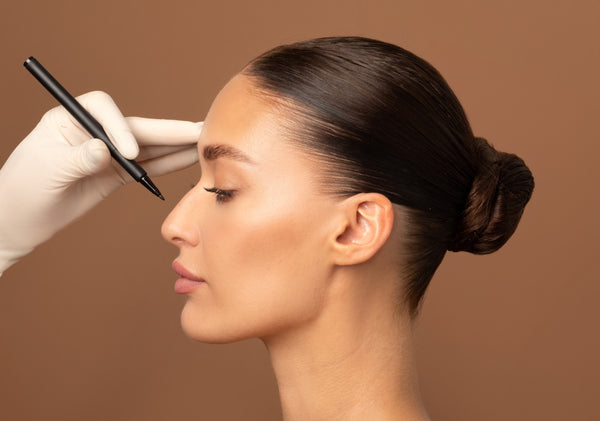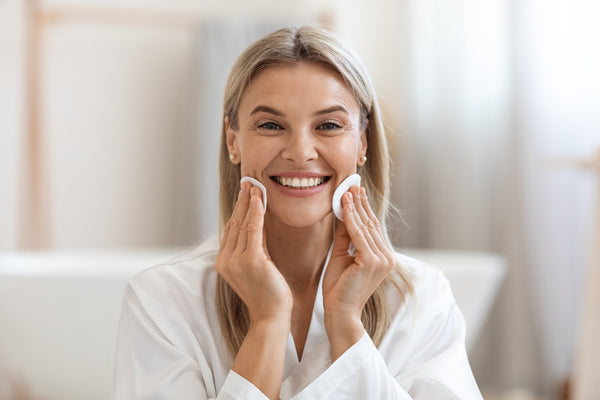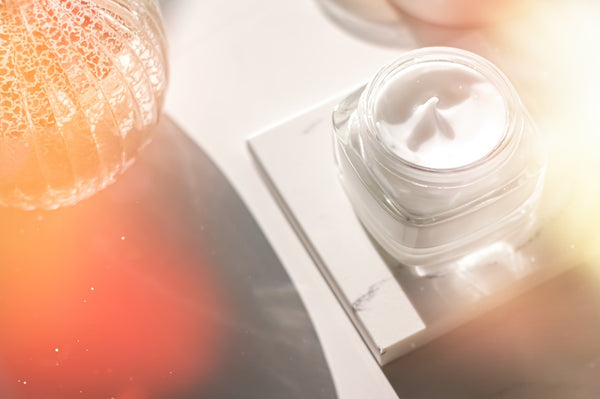5 Makeup Side Effects & 8 Solutions for Healthy, Glowing Skin

Everyday makeup has its positives: a confidence boost, a soothing self-care routine, and self-expression. But are there makeup side effects that come with daily use?
At MD Glam, we want you feeling your absolute best. Suggesting you ditch your makeup? We’d never. Instead, we want to uncover the science of makeup and healthy skin.
Today, we discuss the impact of daily makeup use, the best and worst makeup ingredients, and expertly curated tips to nurture your skin and your glam.
When & Why Makeup Affects Skin
Many factors determine how your skin reacts to makeup, including:
- Your skin type
- How often you wear makeup
- How long you keep it on
- What makeup you use
- Your skincare regimen
Ultimately, it’s about how your skin barrier and makeup interact.
Your skin barrier is the surface layer that protects deeper layers of your skin, while keeping your skin hydrated and moisturized. When it’s healthy, your face looks softer, plumper, and smoother.
But when it’s damaged? Several skin issues can emerge.
5 Negative Side Effects of Daily Makeup
Think makeup might be messing with your skin barrier? Some common side effects are:
Clogged Pores & Acne
Skin congestion and breakouts often result from clogged pores. Makeup that’s comedogenic (pore-clogging) can exacerbate these issues by trapping oils and impurities.
The usual offenders include oil-based liquid foundations, concealers, and primers.
Irritation or Allergic Reactions
Formulas containing synthetic fragrances, dyes, and preservatives can cause contact dermatitis (an itchy or inflamed rash). It can also lead to discoloration and hyperpigmentation.
A common culprit? Eye makeup like mascara, liquid eyeliner, falsies, and eye shadow.
Eye Problems
Eyes are a makeup centerpiece, but they’re also extra sensitive. Potential eye makeup side effects include allergic reactions, dry eye, inflammation, and even pink eye.
Putting makeup on your waterline (tight-lining) blocks protective oil glands and leads to irritation, dryness, or infection. Another no-no is old or shared makeup.
Signs of Aging
The relationship between makeup and skin aging is complicated. Makeup can help cover signs of aging, but does it make those signs appear faster? Yes and no.
If aging signs are already present, some makeup worsens them. Drying ingredients can accentuate wrinkles & fine lines, while comedogenic ones can speed up their formation by limiting collagen production.
Dehydration & Dryness
Hydration is key to helping your skin barrier do its job but dehydrated skin can get overly dry, sensitive, and even oily (to compensate for moisture loss).
Makeup with dehydrating & drying ingredients harms your skin and results in foundation or concealer that looks cracked or creased.
Ingredients: The Good, The Bad, and The Iffy
Your makeup’s ingredients can be a recipe for success or complexion chaos. Let’s get familiar with your product’s formulas.
First, what to steer clear of…
Irritating Ingredients
- Simple Alcohols (SD alcohol, denatured alcohol, ethanol, ethyl, isopropyl, methanol)
- Acetone
- Parabens
- Phthalates
- Synthetic Fragrances
- Sodium Lauryl Sulfate (SLS) & Sodium Laureth Sulfate (SLES)
- Petroleum
- Chunky/Craft Glitters
- Metals (Aluminum, Nickel, Lead, Mercury)
- Talc
- Benzophenone
- Bismuth Oxychloride
- Acrylics
- Formaldehyde
- Hydroquinone
- Triclosan
- Coal Tar Dyes
Now, let’s review which ingredients support skin health.
Safe Ingredients
- Hyaluronic Acid
- Antioxidants (Green Tea Extract & Vitamins C, E, A, B3)
- Broad-spectrum sunscreens (like zinc oxide)
- Ceramides
- Betaine
- Peptides
- Linoleic Acid
- Collagen & Elastin
- Glycerin
- Aloe Vera
- Ferulic Acid
- Argan Oil
- Natural Fatty Alcohols
- Polyglutamic Acid
Ingredients For Some, Not Others
Some ingredients are friends and foes, depending on your skin type:
- Glycolic Acid: Best for dry to normal, aging, and hyperpigmentation-prone skin; Iffy for oily, sensitive, or sunborn-prone skin
- Salicylic Acid: Best for acne-prone or oily skin; Iffy for dry skin
- Retinol: Better for oily skin; Iffy in high concentration for sensitive or dry skin
- Botanical Oils: Good for acne-prone or combination skin; Iffy for sensitive or dry skin
- Mineral Oils: Good for dry or extra sensitive skin; Iffy for acne-prone or oily skin
- Lactic Acid: Best for aging, discolored, or mildly sensitive skin; Iffy for extra sensitive skin; Don’t use with Vitamin C or Retinol
- Squalene: Best for dry, combination, or sensitive skin; Iffy for oily or acne-prone skin
8 Tips to Balance Makeup with Healthy Skin
Good news: you don’t have to go bare-faced to maintain healthy skin. In fact, the right skincare will only help your makeup look better!
You just need healthy makeup habits:
- Always Remove Makeup Before Bed
Sleeping with makeup won’t just stain sheets — it’ll mess with your skin’s regenerative process, triggering breakouts, dullness, wrinkles, and other reactions. Cleansing your face daily is a must.
For safe makeup removal, you could do a long double- or triple-cleanse with multiple products… or you could use one product that does it all.
MD Glam’s Deep Pore Foaming Cleanser removes makeup, excess oils, and impurities with a mighty but gentle, hydrating and anti-aging formula.
- Remove Makeup Safely
Dermatologist makeup tips include removal guidelines.
Makeup removal DON’Ts:
- Use makeup wipes (at least not without a cleanser afterwards)
- Use harsh, chunky cleansers
- Scrub too roughly
- Use scorching water that dries out your skin
Onto the makeup removal DOs:
- Wash hands first
- Give your cleanser time to break up makeup
- Use clean cotton pads or balls, not abrasive cloths
- Be gentle
- Use lukewarm water
Clean face? Check. Now we bring back the hydration.
- Keep Your Skin Hydrated & Moisturized
Remember the oh-so-important skin barrier? It takes care of you, so you need to take care of it. That’s why hydration and moisture, especially after cleansing, is crucial.
Dr. Cat’s holy grail for nighttime moisture: Hyaluronic Acid Night C-Complex. The luxurious formula’s hyaluronic acid, antioxidants, and smoothing glycolic acid leave your skin deeply hydrated and radiant.
Dry skin? Layer daytime moisturizer like the hydrating, lightweight DMAE Antioxidant Day Moisturizer before sunscreen and makeup.
- Protect Yourself from Sun Exposure
UV exposure risks are undeniable: skin cell damage, premature aging, and skin cancer? No thanks. That’s why sunscreen is non-negotiable, with or without makeup.
Sunscreen and good-looking makeup aren’t mutually exclusive, either. MD Glam’s Sunshout Sunscreen SPF 50’s weightless, hydrating formula lets your makeup shine while fully protecting your skin — sans the white cast and oil slicks.
- Take Makeup Breaks
Although your skin doesn’t breathe, giving it breaks from makeup can help it get more oxygen and repair itself, especially if it’s wigging out.
Try to incorporate a few no-makeup days per week to give your complexion a breather.
- Opt for Skincare-Makeup Hybrids
Tired of using heaps of products, spending hours on makeup and skincare every day? Enter: skinimalism.
Skinimalism was a response to over-the-top, multi-product skincare routines. Who has the time? Plus, fewer products means fewer potential skin problems.
Instead, use a few high-quality makeup with skincare products.
- Toss Expired Makeup
Regardless of ingredients, expired makeup and skincare can harm your skin.
Know when to throw away your products and set reminders to stock up on replacements.
- Clean Your Makeup Brushes Regularly
Dirty makeup brushes = paradise for bad bacteria.
If you wear makeup daily, clean and sanitize your brushes once a week or so. For in-between days, use antibacterial brush spray to avoid skin irritation.
MD Glam: Your Partner for Radiant Skin and Flawless Makeup
Navigating potential makeup side effects doesn’t have to be a constant headache. With the right products and practices, you can create a skin-loving routine that boosts your confidence – sans side effects.
Stay in tune to your skin, pay attention to ingredients, and lean on high-quality products that work for you, not against you.
Browse MD Glam’s expertly formulated, medical-grade skincare!








